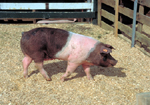|
Salmonella infects more than 160 000 individuals in the EU annually of which it is estimated that around 200 die. The overall frequency of Salmonella contamination in retail chicken in the UK in 2002 was 5.7% and is much lower than previous national surveys undertaken for whole chicken by the Advisory Committee on the Microbiological Safety of Food (ACMSF). It is estimated that 3 cases of salmonella occur for every 1 reported. Reported cases of Salmonellosis in people have fallen since 1998 (althought there was a reverse between 2000-1) mainly as a result of monitoring and measures introduced by the poultry industry and greater application of Assurance schemes. MLC Research published 2000 found that 23% of pigs arriving at abattoirs carry Salmonella,although the number of cases of Salmonella poisoning in people connected with pork and pork products is low. The World Health Organisation have found that since the beginning of the 1990s, strains of Salmonella typhimurium, which are resistant to a range of antibiotics, have emerged and are threatening to become a serious public health problem.They say there is evidence that the some of these strains may have emerged due to use of antibiotics in intensive animal husbandry. For more see antibiotics.
The EU introduced two new laws in October 2003 to cut the incidence of food-borne diseases. The Commissioner said: "This legislation will significantly decrease the presence of salmonella on farms and should reduce human infections." |
© 2003 EP@W Publishing Co Ltd
Photos courtesy of http://www.usda.gov


